The Impact of Immunonutrition on Cancer: Omega-3 Fatty Acids
VerifiedAdded on 2022/08/20
|12
|2968
|224
Essay
AI Summary
This essay critically reviews the role of immunonutrition, specifically focusing on omega-3 fatty acids, in the treatment of cancer. It begins by defining immunonutrition and its relevance to modulating the immune system, particularly in the context of cancer. The essay delves into the mechanisms of cancer, including its aetiology, pathogenesis, and genetic mechanisms, alongside clinical manifestations and cancer statistics. It then explores the role of immunonutrition, highlighting the benefits of omega-3 fatty acids in reducing inflammatory responses, modulating molecular pathways, and potentially increasing the efficacy of chemotherapy. The essay discusses the impact of omega-3 fatty acids on T-cell function and the overall immune status of cancer patients. It further examines the impact of immunonutrition on estrogen levels and apoptosis, addressing the potential side effects of excessive or insufficient intake. Finally, it concludes that an adequate amount of omega-3 fatty acid consumption could be a novel immunotherapy for cancer patients.
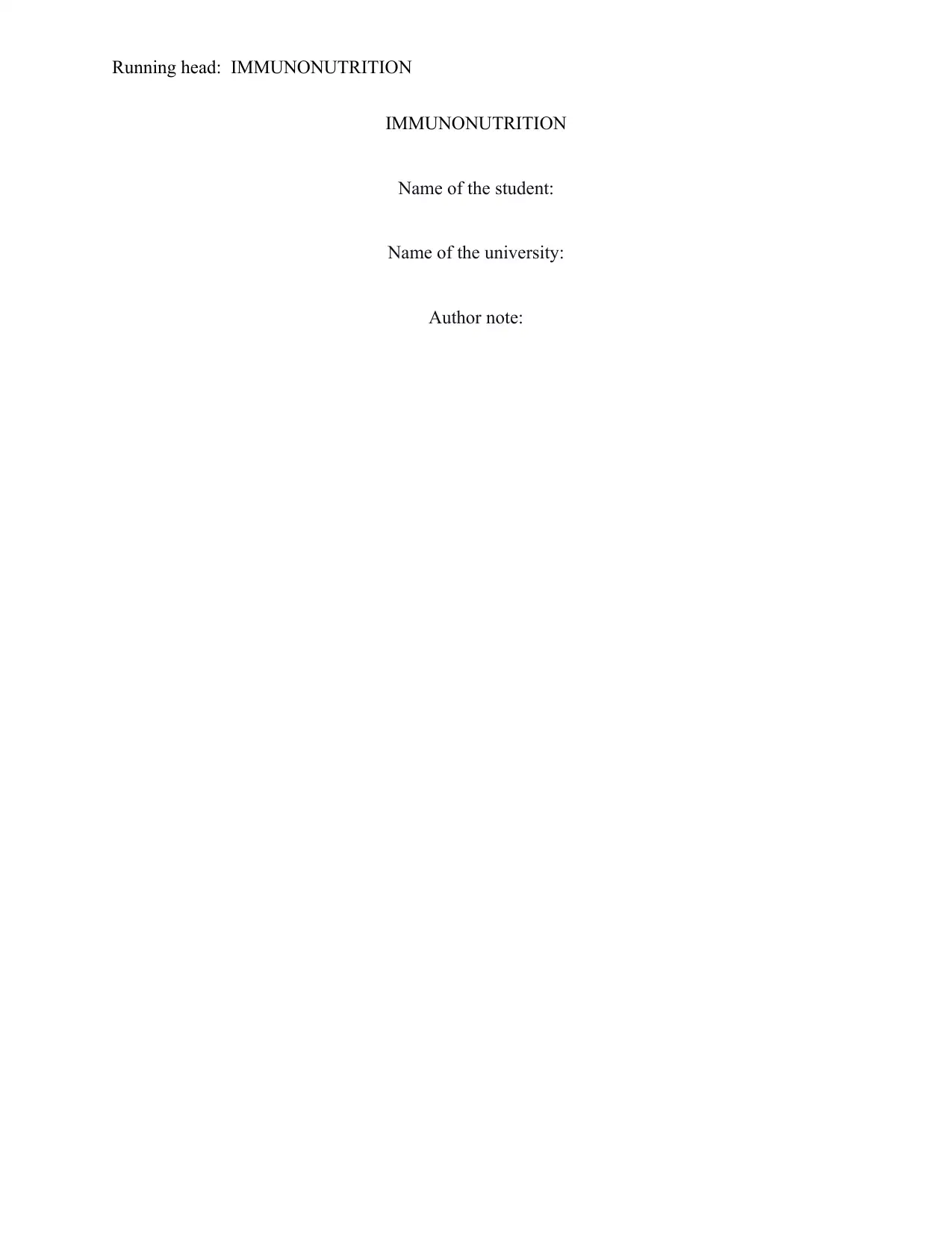
Running head: IMMUNONUTRITION
IMMUNONUTRITION
Name of the student:
Name of the university:
Author note:
IMMUNONUTRITION
Name of the student:
Name of the university:
Author note:
Paraphrase This Document
Need a fresh take? Get an instant paraphrase of this document with our AI Paraphraser
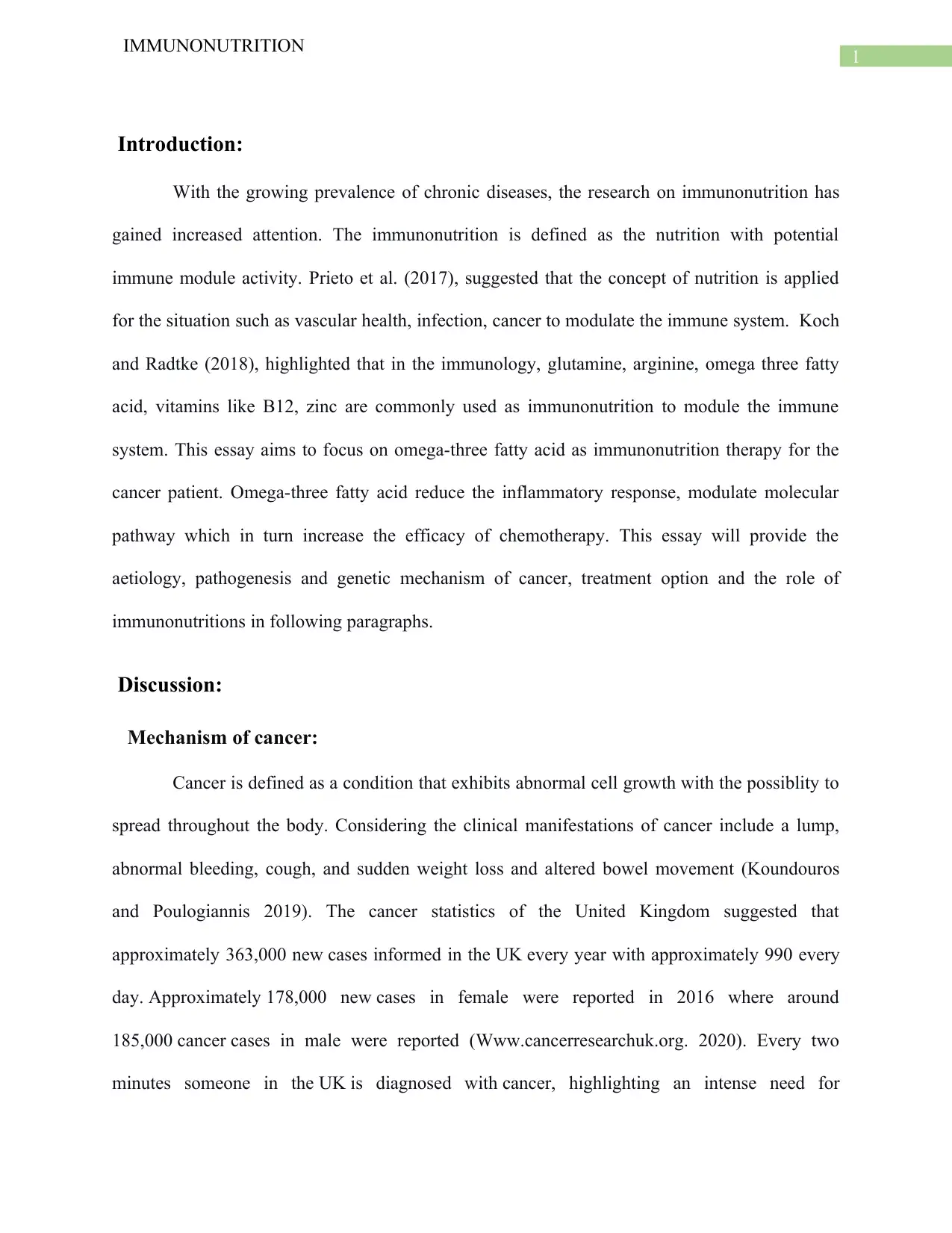
1
IMMUNONUTRITION
Introduction:
With the growing prevalence of chronic diseases, the research on immunonutrition has
gained increased attention. The immunonutrition is defined as the nutrition with potential
immune module activity. Prieto et al. (2017), suggested that the concept of nutrition is applied
for the situation such as vascular health, infection, cancer to modulate the immune system. Koch
and Radtke (2018), highlighted that in the immunology, glutamine, arginine, omega three fatty
acid, vitamins like B12, zinc are commonly used as immunonutrition to module the immune
system. This essay aims to focus on omega-three fatty acid as immunonutrition therapy for the
cancer patient. Omega-three fatty acid reduce the inflammatory response, modulate molecular
pathway which in turn increase the efficacy of chemotherapy. This essay will provide the
aetiology, pathogenesis and genetic mechanism of cancer, treatment option and the role of
immunonutritions in following paragraphs.
Discussion:
Mechanism of cancer:
Cancer is defined as a condition that exhibits abnormal cell growth with the possiblity to
spread throughout the body. Considering the clinical manifestations of cancer include a lump,
abnormal bleeding, cough, and sudden weight loss and altered bowel movement (Koundouros
and Poulogiannis 2019). The cancer statistics of the United Kingdom suggested that
approximately 363,000 new cases informed in the UK every year with approximately 990 every
day. Approximately 178,000 new cases in female were reported in 2016 where around
185,000 cancer cases in male were reported (Www.cancerresearchuk.org. 2020). Every two
minutes someone in the UK is diagnosed with cancer, highlighting an intense need for
IMMUNONUTRITION
Introduction:
With the growing prevalence of chronic diseases, the research on immunonutrition has
gained increased attention. The immunonutrition is defined as the nutrition with potential
immune module activity. Prieto et al. (2017), suggested that the concept of nutrition is applied
for the situation such as vascular health, infection, cancer to modulate the immune system. Koch
and Radtke (2018), highlighted that in the immunology, glutamine, arginine, omega three fatty
acid, vitamins like B12, zinc are commonly used as immunonutrition to module the immune
system. This essay aims to focus on omega-three fatty acid as immunonutrition therapy for the
cancer patient. Omega-three fatty acid reduce the inflammatory response, modulate molecular
pathway which in turn increase the efficacy of chemotherapy. This essay will provide the
aetiology, pathogenesis and genetic mechanism of cancer, treatment option and the role of
immunonutritions in following paragraphs.
Discussion:
Mechanism of cancer:
Cancer is defined as a condition that exhibits abnormal cell growth with the possiblity to
spread throughout the body. Considering the clinical manifestations of cancer include a lump,
abnormal bleeding, cough, and sudden weight loss and altered bowel movement (Koundouros
and Poulogiannis 2019). The cancer statistics of the United Kingdom suggested that
approximately 363,000 new cases informed in the UK every year with approximately 990 every
day. Approximately 178,000 new cases in female were reported in 2016 where around
185,000 cancer cases in male were reported (Www.cancerresearchuk.org. 2020). Every two
minutes someone in the UK is diagnosed with cancer, highlighting an intense need for
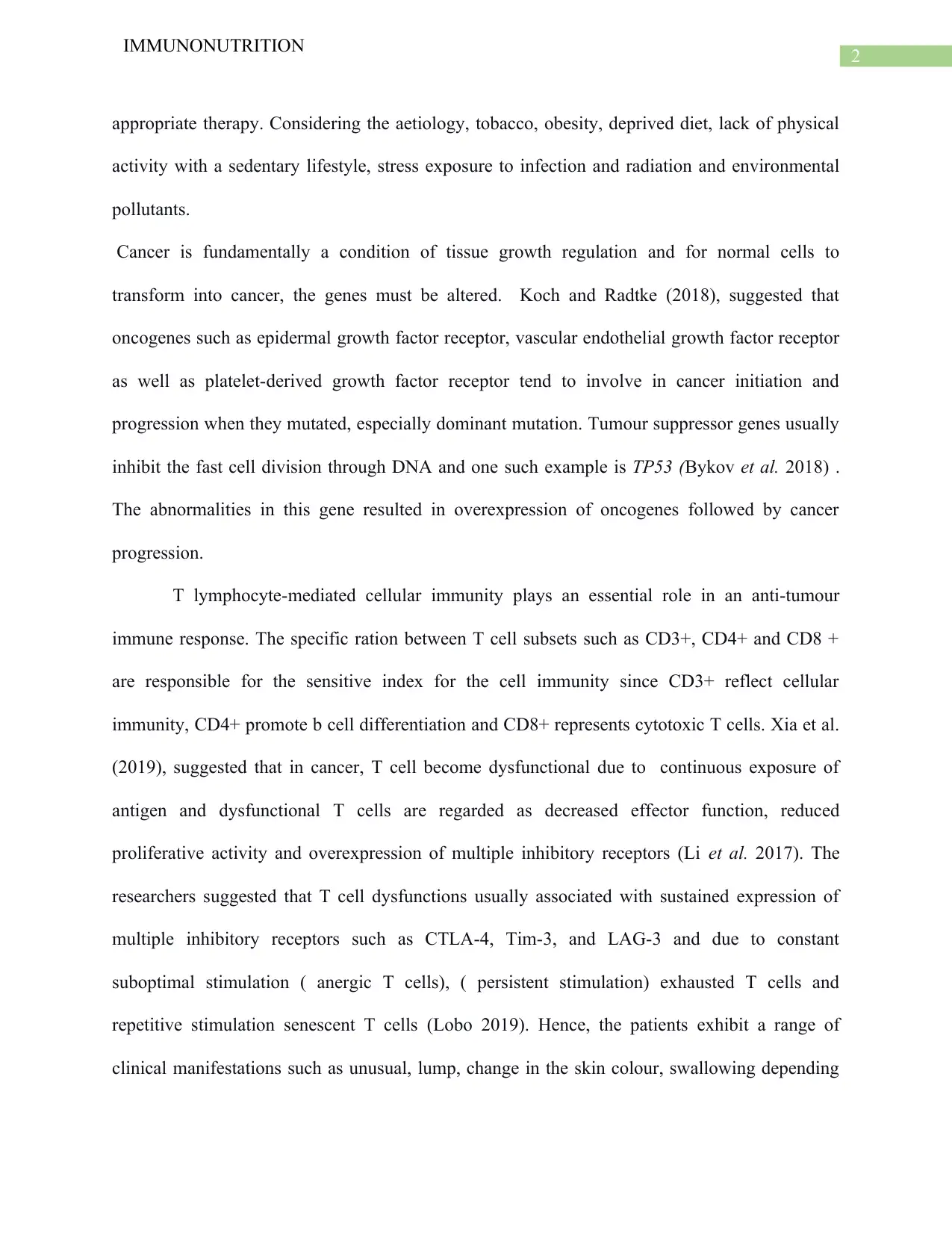
2
IMMUNONUTRITION
appropriate therapy. Considering the aetiology, tobacco, obesity, deprived diet, lack of physical
activity with a sedentary lifestyle, stress exposure to infection and radiation and environmental
pollutants.
Cancer is fundamentally a condition of tissue growth regulation and for normal cells to
transform into cancer, the genes must be altered. Koch and Radtke (2018), suggested that
oncogenes such as epidermal growth factor receptor, vascular endothelial growth factor receptor
as well as platelet-derived growth factor receptor tend to involve in cancer initiation and
progression when they mutated, especially dominant mutation. Tumour suppressor genes usually
inhibit the fast cell division through DNA and one such example is TP53 (Bykov et al. 2018) .
The abnormalities in this gene resulted in overexpression of oncogenes followed by cancer
progression.
T lymphocyte-mediated cellular immunity plays an essential role in an anti-tumour
immune response. The specific ration between T cell subsets such as CD3+, CD4+ and CD8 +
are responsible for the sensitive index for the cell immunity since CD3+ reflect cellular
immunity, CD4+ promote b cell differentiation and CD8+ represents cytotoxic T cells. Xia et al.
(2019), suggested that in cancer, T cell become dysfunctional due to continuous exposure of
antigen and dysfunctional T cells are regarded as decreased effector function, reduced
proliferative activity and overexpression of multiple inhibitory receptors (Li et al. 2017). The
researchers suggested that T cell dysfunctions usually associated with sustained expression of
multiple inhibitory receptors such as CTLA-4, Tim-3, and LAG-3 and due to constant
suboptimal stimulation ( anergic T cells), ( persistent stimulation) exhausted T cells and
repetitive stimulation senescent T cells (Lobo 2019). Hence, the patients exhibit a range of
clinical manifestations such as unusual, lump, change in the skin colour, swallowing depending
IMMUNONUTRITION
appropriate therapy. Considering the aetiology, tobacco, obesity, deprived diet, lack of physical
activity with a sedentary lifestyle, stress exposure to infection and radiation and environmental
pollutants.
Cancer is fundamentally a condition of tissue growth regulation and for normal cells to
transform into cancer, the genes must be altered. Koch and Radtke (2018), suggested that
oncogenes such as epidermal growth factor receptor, vascular endothelial growth factor receptor
as well as platelet-derived growth factor receptor tend to involve in cancer initiation and
progression when they mutated, especially dominant mutation. Tumour suppressor genes usually
inhibit the fast cell division through DNA and one such example is TP53 (Bykov et al. 2018) .
The abnormalities in this gene resulted in overexpression of oncogenes followed by cancer
progression.
T lymphocyte-mediated cellular immunity plays an essential role in an anti-tumour
immune response. The specific ration between T cell subsets such as CD3+, CD4+ and CD8 +
are responsible for the sensitive index for the cell immunity since CD3+ reflect cellular
immunity, CD4+ promote b cell differentiation and CD8+ represents cytotoxic T cells. Xia et al.
(2019), suggested that in cancer, T cell become dysfunctional due to continuous exposure of
antigen and dysfunctional T cells are regarded as decreased effector function, reduced
proliferative activity and overexpression of multiple inhibitory receptors (Li et al. 2017). The
researchers suggested that T cell dysfunctions usually associated with sustained expression of
multiple inhibitory receptors such as CTLA-4, Tim-3, and LAG-3 and due to constant
suboptimal stimulation ( anergic T cells), ( persistent stimulation) exhausted T cells and
repetitive stimulation senescent T cells (Lobo 2019). Hence, the patients exhibit a range of
clinical manifestations such as unusual, lump, change in the skin colour, swallowing depending
⊘ This is a preview!⊘
Do you want full access?
Subscribe today to unlock all pages.

Trusted by 1+ million students worldwide
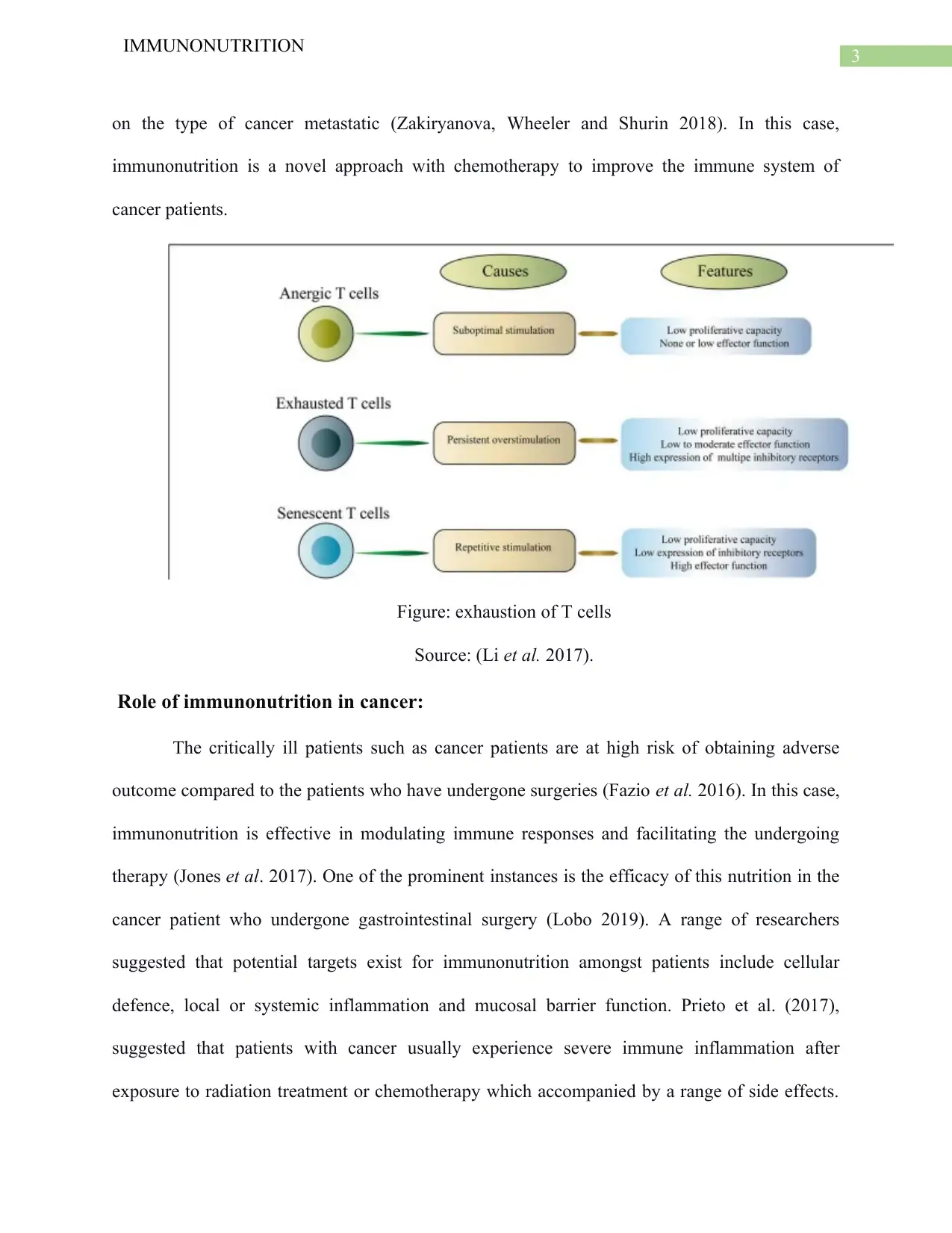
3
IMMUNONUTRITION
on the type of cancer metastatic (Zakiryanova, Wheeler and Shurin 2018). In this case,
immunonutrition is a novel approach with chemotherapy to improve the immune system of
cancer patients.
Figure: exhaustion of T cells
Source: (Li et al. 2017).
Role of immunonutrition in cancer:
The critically ill patients such as cancer patients are at high risk of obtaining adverse
outcome compared to the patients who have undergone surgeries (Fazio et al. 2016). In this case,
immunonutrition is effective in modulating immune responses and facilitating the undergoing
therapy (Jones et al. 2017). One of the prominent instances is the efficacy of this nutrition in the
cancer patient who undergone gastrointestinal surgery (Lobo 2019). A range of researchers
suggested that potential targets exist for immunonutrition amongst patients include cellular
defence, local or systemic inflammation and mucosal barrier function. Prieto et al. (2017),
suggested that patients with cancer usually experience severe immune inflammation after
exposure to radiation treatment or chemotherapy which accompanied by a range of side effects.
IMMUNONUTRITION
on the type of cancer metastatic (Zakiryanova, Wheeler and Shurin 2018). In this case,
immunonutrition is a novel approach with chemotherapy to improve the immune system of
cancer patients.
Figure: exhaustion of T cells
Source: (Li et al. 2017).
Role of immunonutrition in cancer:
The critically ill patients such as cancer patients are at high risk of obtaining adverse
outcome compared to the patients who have undergone surgeries (Fazio et al. 2016). In this case,
immunonutrition is effective in modulating immune responses and facilitating the undergoing
therapy (Jones et al. 2017). One of the prominent instances is the efficacy of this nutrition in the
cancer patient who undergone gastrointestinal surgery (Lobo 2019). A range of researchers
suggested that potential targets exist for immunonutrition amongst patients include cellular
defence, local or systemic inflammation and mucosal barrier function. Prieto et al. (2017),
suggested that patients with cancer usually experience severe immune inflammation after
exposure to radiation treatment or chemotherapy which accompanied by a range of side effects.
Paraphrase This Document
Need a fresh take? Get an instant paraphrase of this document with our AI Paraphraser
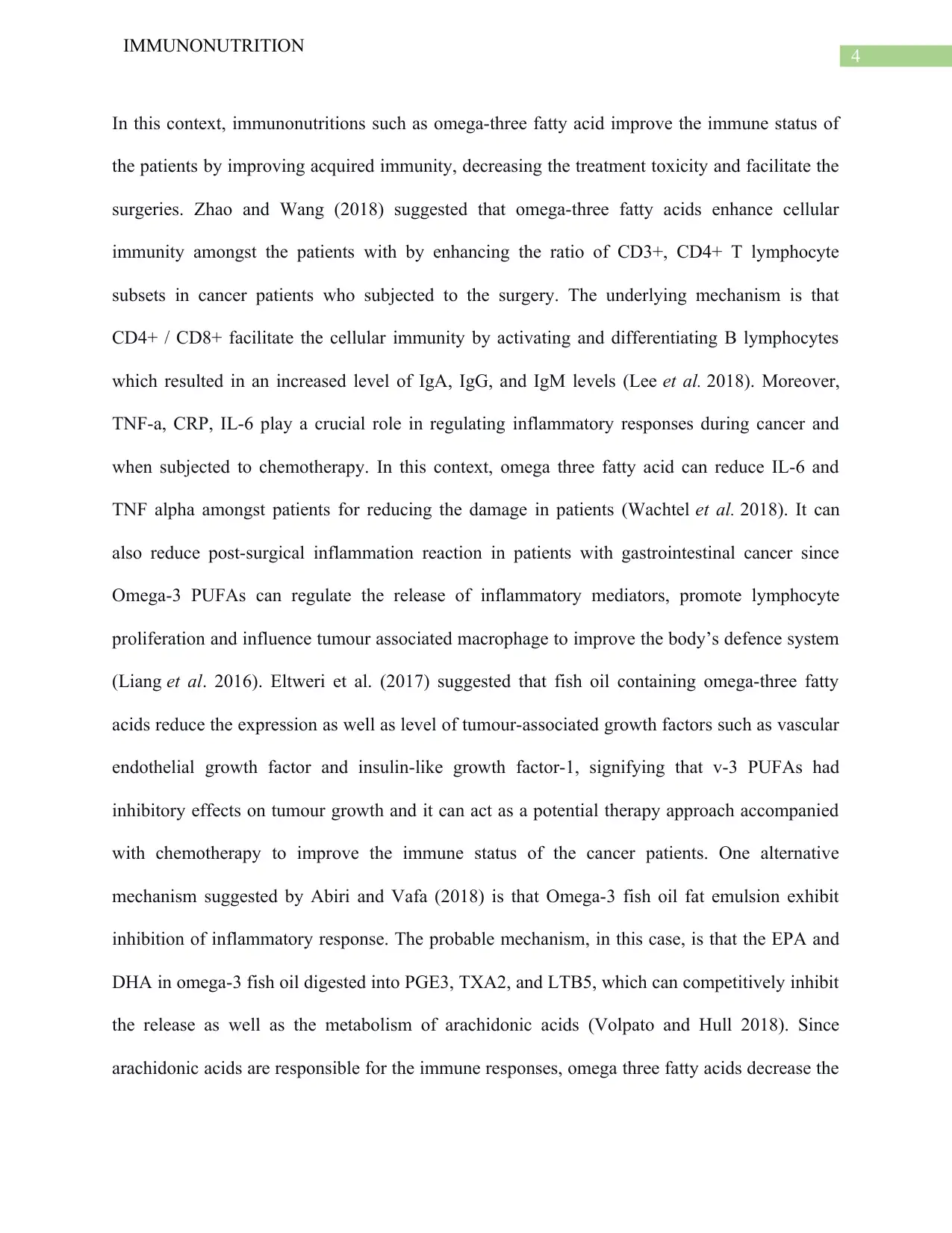
4
IMMUNONUTRITION
In this context, immunonutritions such as omega-three fatty acid improve the immune status of
the patients by improving acquired immunity, decreasing the treatment toxicity and facilitate the
surgeries. Zhao and Wang (2018) suggested that omega-three fatty acids enhance cellular
immunity amongst the patients with by enhancing the ratio of CD3+, CD4+ T lymphocyte
subsets in cancer patients who subjected to the surgery. The underlying mechanism is that
CD4+ / CD8+ facilitate the cellular immunity by activating and differentiating B lymphocytes
which resulted in an increased level of IgA, IgG, and IgM levels (Lee et al. 2018). Moreover,
TNF-a, CRP, IL-6 play a crucial role in regulating inflammatory responses during cancer and
when subjected to chemotherapy. In this context, omega three fatty acid can reduce IL-6 and
TNF alpha amongst patients for reducing the damage in patients (Wachtel et al. 2018). It can
also reduce post-surgical inflammation reaction in patients with gastrointestinal cancer since
Omega-3 PUFAs can regulate the release of inflammatory mediators, promote lymphocyte
proliferation and influence tumour associated macrophage to improve the body’s defence system
(Liang et al. 2016). Eltweri et al. (2017) suggested that fish oil containing omega-three fatty
acids reduce the expression as well as level of tumour-associated growth factors such as vascular
endothelial growth factor and insulin-like growth factor-1, signifying that v-3 PUFAs had
inhibitory effects on tumour growth and it can act as a potential therapy approach accompanied
with chemotherapy to improve the immune status of the cancer patients. One alternative
mechanism suggested by Abiri and Vafa (2018) is that Omega-3 fish oil fat emulsion exhibit
inhibition of inflammatory response. The probable mechanism, in this case, is that the EPA and
DHA in omega-3 fish oil digested into PGE3, TXA2, and LTB5, which can competitively inhibit
the release as well as the metabolism of arachidonic acids (Volpato and Hull 2018). Since
arachidonic acids are responsible for the immune responses, omega three fatty acids decrease the
IMMUNONUTRITION
In this context, immunonutritions such as omega-three fatty acid improve the immune status of
the patients by improving acquired immunity, decreasing the treatment toxicity and facilitate the
surgeries. Zhao and Wang (2018) suggested that omega-three fatty acids enhance cellular
immunity amongst the patients with by enhancing the ratio of CD3+, CD4+ T lymphocyte
subsets in cancer patients who subjected to the surgery. The underlying mechanism is that
CD4+ / CD8+ facilitate the cellular immunity by activating and differentiating B lymphocytes
which resulted in an increased level of IgA, IgG, and IgM levels (Lee et al. 2018). Moreover,
TNF-a, CRP, IL-6 play a crucial role in regulating inflammatory responses during cancer and
when subjected to chemotherapy. In this context, omega three fatty acid can reduce IL-6 and
TNF alpha amongst patients for reducing the damage in patients (Wachtel et al. 2018). It can
also reduce post-surgical inflammation reaction in patients with gastrointestinal cancer since
Omega-3 PUFAs can regulate the release of inflammatory mediators, promote lymphocyte
proliferation and influence tumour associated macrophage to improve the body’s defence system
(Liang et al. 2016). Eltweri et al. (2017) suggested that fish oil containing omega-three fatty
acids reduce the expression as well as level of tumour-associated growth factors such as vascular
endothelial growth factor and insulin-like growth factor-1, signifying that v-3 PUFAs had
inhibitory effects on tumour growth and it can act as a potential therapy approach accompanied
with chemotherapy to improve the immune status of the cancer patients. One alternative
mechanism suggested by Abiri and Vafa (2018) is that Omega-3 fish oil fat emulsion exhibit
inhibition of inflammatory response. The probable mechanism, in this case, is that the EPA and
DHA in omega-3 fish oil digested into PGE3, TXA2, and LTB5, which can competitively inhibit
the release as well as the metabolism of arachidonic acids (Volpato and Hull 2018). Since
arachidonic acids are responsible for the immune responses, omega three fatty acids decrease the
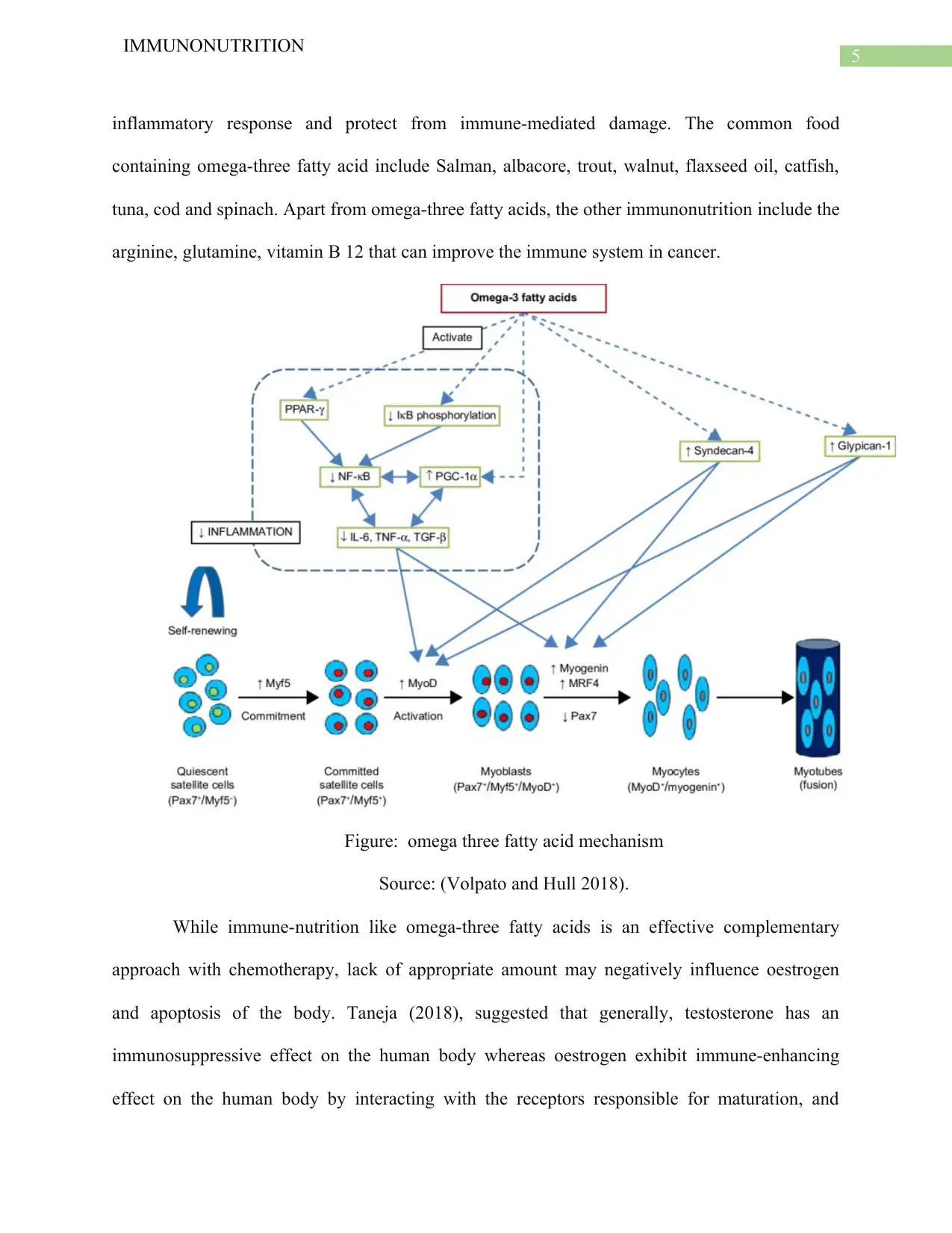
5
IMMUNONUTRITION
inflammatory response and protect from immune-mediated damage. The common food
containing omega-three fatty acid include Salman, albacore, trout, walnut, flaxseed oil, catfish,
tuna, cod and spinach. Apart from omega-three fatty acids, the other immunonutrition include the
arginine, glutamine, vitamin B 12 that can improve the immune system in cancer.
Figure: omega three fatty acid mechanism
Source: (Volpato and Hull 2018).
While immune-nutrition like omega-three fatty acids is an effective complementary
approach with chemotherapy, lack of appropriate amount may negatively influence oestrogen
and apoptosis of the body. Taneja (2018), suggested that generally, testosterone has an
immunosuppressive effect on the human body whereas oestrogen exhibit immune-enhancing
effect on the human body by interacting with the receptors responsible for maturation, and
IMMUNONUTRITION
inflammatory response and protect from immune-mediated damage. The common food
containing omega-three fatty acid include Salman, albacore, trout, walnut, flaxseed oil, catfish,
tuna, cod and spinach. Apart from omega-three fatty acids, the other immunonutrition include the
arginine, glutamine, vitamin B 12 that can improve the immune system in cancer.
Figure: omega three fatty acid mechanism
Source: (Volpato and Hull 2018).
While immune-nutrition like omega-three fatty acids is an effective complementary
approach with chemotherapy, lack of appropriate amount may negatively influence oestrogen
and apoptosis of the body. Taneja (2018), suggested that generally, testosterone has an
immunosuppressive effect on the human body whereas oestrogen exhibit immune-enhancing
effect on the human body by interacting with the receptors responsible for maturation, and
⊘ This is a preview!⊘
Do you want full access?
Subscribe today to unlock all pages.

Trusted by 1+ million students worldwide
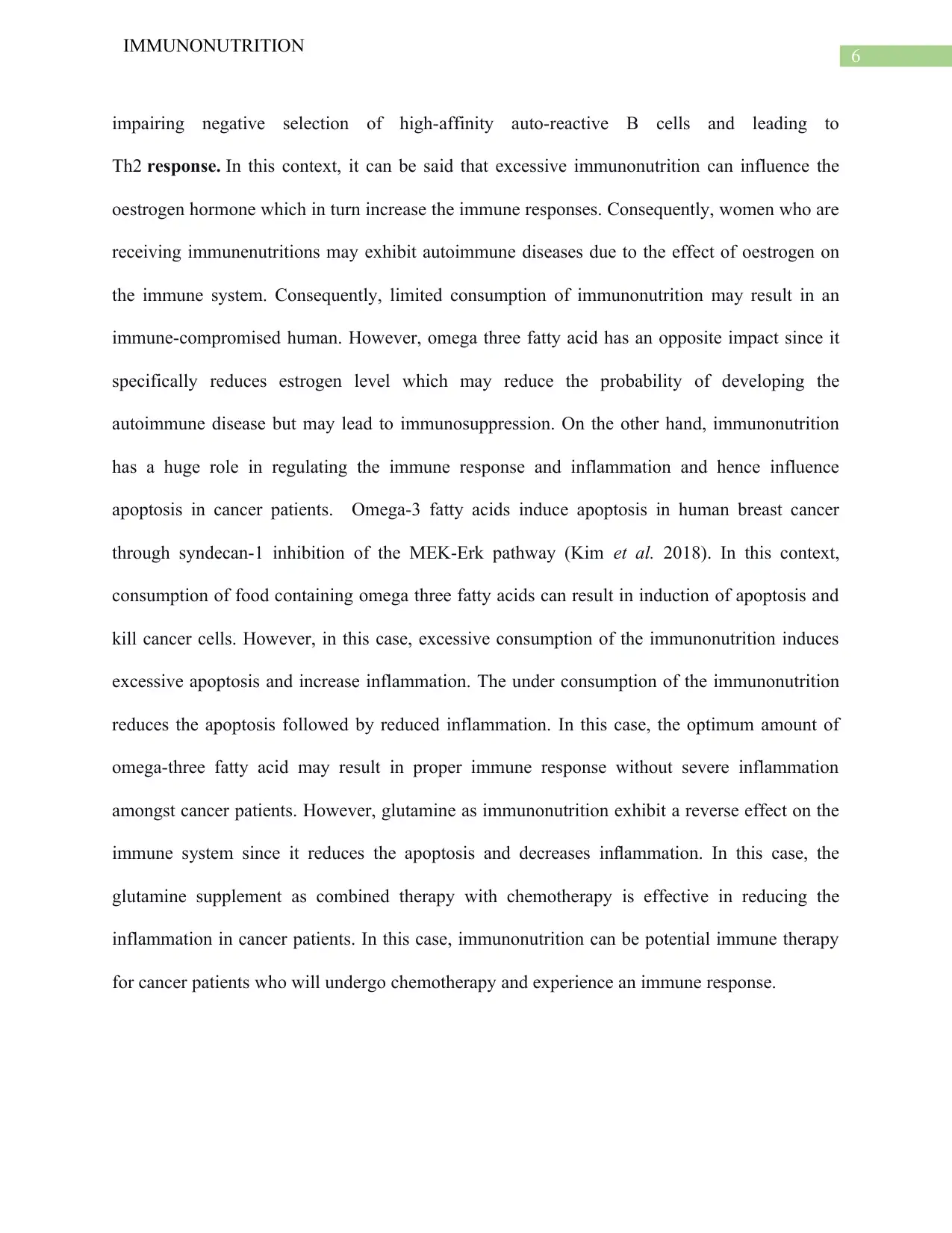
6
IMMUNONUTRITION
impairing negative selection of high-affinity auto-reactive B cells and leading to
Th2 response. In this context, it can be said that excessive immunonutrition can influence the
oestrogen hormone which in turn increase the immune responses. Consequently, women who are
receiving immunenutritions may exhibit autoimmune diseases due to the effect of oestrogen on
the immune system. Consequently, limited consumption of immunonutrition may result in an
immune-compromised human. However, omega three fatty acid has an opposite impact since it
specifically reduces estrogen level which may reduce the probability of developing the
autoimmune disease but may lead to immunosuppression. On the other hand, immunonutrition
has a huge role in regulating the immune response and inflammation and hence influence
apoptosis in cancer patients. Omega-3 fatty acids induce apoptosis in human breast cancer
through syndecan-1 inhibition of the MEK-Erk pathway (Kim et al. 2018). In this context,
consumption of food containing omega three fatty acids can result in induction of apoptosis and
kill cancer cells. However, in this case, excessive consumption of the immunonutrition induces
excessive apoptosis and increase inflammation. The under consumption of the immunonutrition
reduces the apoptosis followed by reduced inflammation. In this case, the optimum amount of
omega-three fatty acid may result in proper immune response without severe inflammation
amongst cancer patients. However, glutamine as immunonutrition exhibit a reverse effect on the
immune system since it reduces the apoptosis and decreases inflammation. In this case, the
glutamine supplement as combined therapy with chemotherapy is effective in reducing the
inflammation in cancer patients. In this case, immunonutrition can be potential immune therapy
for cancer patients who will undergo chemotherapy and experience an immune response.
IMMUNONUTRITION
impairing negative selection of high-affinity auto-reactive B cells and leading to
Th2 response. In this context, it can be said that excessive immunonutrition can influence the
oestrogen hormone which in turn increase the immune responses. Consequently, women who are
receiving immunenutritions may exhibit autoimmune diseases due to the effect of oestrogen on
the immune system. Consequently, limited consumption of immunonutrition may result in an
immune-compromised human. However, omega three fatty acid has an opposite impact since it
specifically reduces estrogen level which may reduce the probability of developing the
autoimmune disease but may lead to immunosuppression. On the other hand, immunonutrition
has a huge role in regulating the immune response and inflammation and hence influence
apoptosis in cancer patients. Omega-3 fatty acids induce apoptosis in human breast cancer
through syndecan-1 inhibition of the MEK-Erk pathway (Kim et al. 2018). In this context,
consumption of food containing omega three fatty acids can result in induction of apoptosis and
kill cancer cells. However, in this case, excessive consumption of the immunonutrition induces
excessive apoptosis and increase inflammation. The under consumption of the immunonutrition
reduces the apoptosis followed by reduced inflammation. In this case, the optimum amount of
omega-three fatty acid may result in proper immune response without severe inflammation
amongst cancer patients. However, glutamine as immunonutrition exhibit a reverse effect on the
immune system since it reduces the apoptosis and decreases inflammation. In this case, the
glutamine supplement as combined therapy with chemotherapy is effective in reducing the
inflammation in cancer patients. In this case, immunonutrition can be potential immune therapy
for cancer patients who will undergo chemotherapy and experience an immune response.
Paraphrase This Document
Need a fresh take? Get an instant paraphrase of this document with our AI Paraphraser
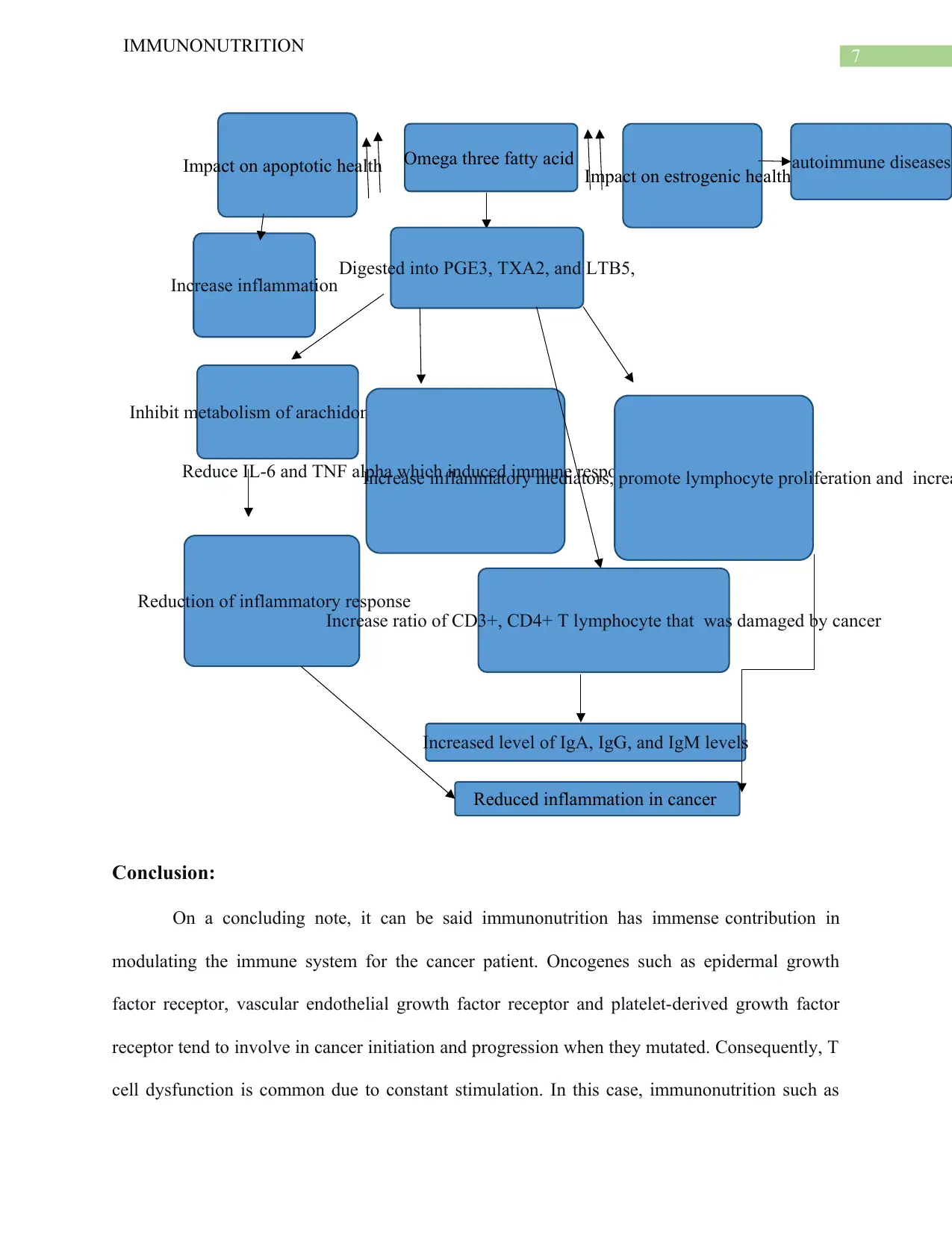
7
IMMUNONUTRITION
Omega three fatty acid
Digested into PGE3, TXA2, and LTB5,
Inhibit metabolism of arachidonic acids
Reduction of inflammatory response
Reduce IL-6 and TNF alpha which induced immune response during cancerIncrease inflammatory mediators, promote lymphocyte proliferation and increa
Increase ratio of CD3+, CD4+ T lymphocyte that was damaged by cancer
Increased level of IgA, IgG, and IgM levels
autoimmune diseases
Impact on estrogenic health
Increase inflammation
Impact on apoptotic health
Reduced inflammation in cancer
Conclusion:
On a concluding note, it can be said immunonutrition has immense contribution in
modulating the immune system for the cancer patient. Oncogenes such as epidermal growth
factor receptor, vascular endothelial growth factor receptor and platelet-derived growth factor
receptor tend to involve in cancer initiation and progression when they mutated. Consequently, T
cell dysfunction is common due to constant stimulation. In this case, immunonutrition such as
IMMUNONUTRITION
Omega three fatty acid
Digested into PGE3, TXA2, and LTB5,
Inhibit metabolism of arachidonic acids
Reduction of inflammatory response
Reduce IL-6 and TNF alpha which induced immune response during cancerIncrease inflammatory mediators, promote lymphocyte proliferation and increa
Increase ratio of CD3+, CD4+ T lymphocyte that was damaged by cancer
Increased level of IgA, IgG, and IgM levels
autoimmune diseases
Impact on estrogenic health
Increase inflammation
Impact on apoptotic health
Reduced inflammation in cancer
Conclusion:
On a concluding note, it can be said immunonutrition has immense contribution in
modulating the immune system for the cancer patient. Oncogenes such as epidermal growth
factor receptor, vascular endothelial growth factor receptor and platelet-derived growth factor
receptor tend to involve in cancer initiation and progression when they mutated. Consequently, T
cell dysfunction is common due to constant stimulation. In this case, immunonutrition such as
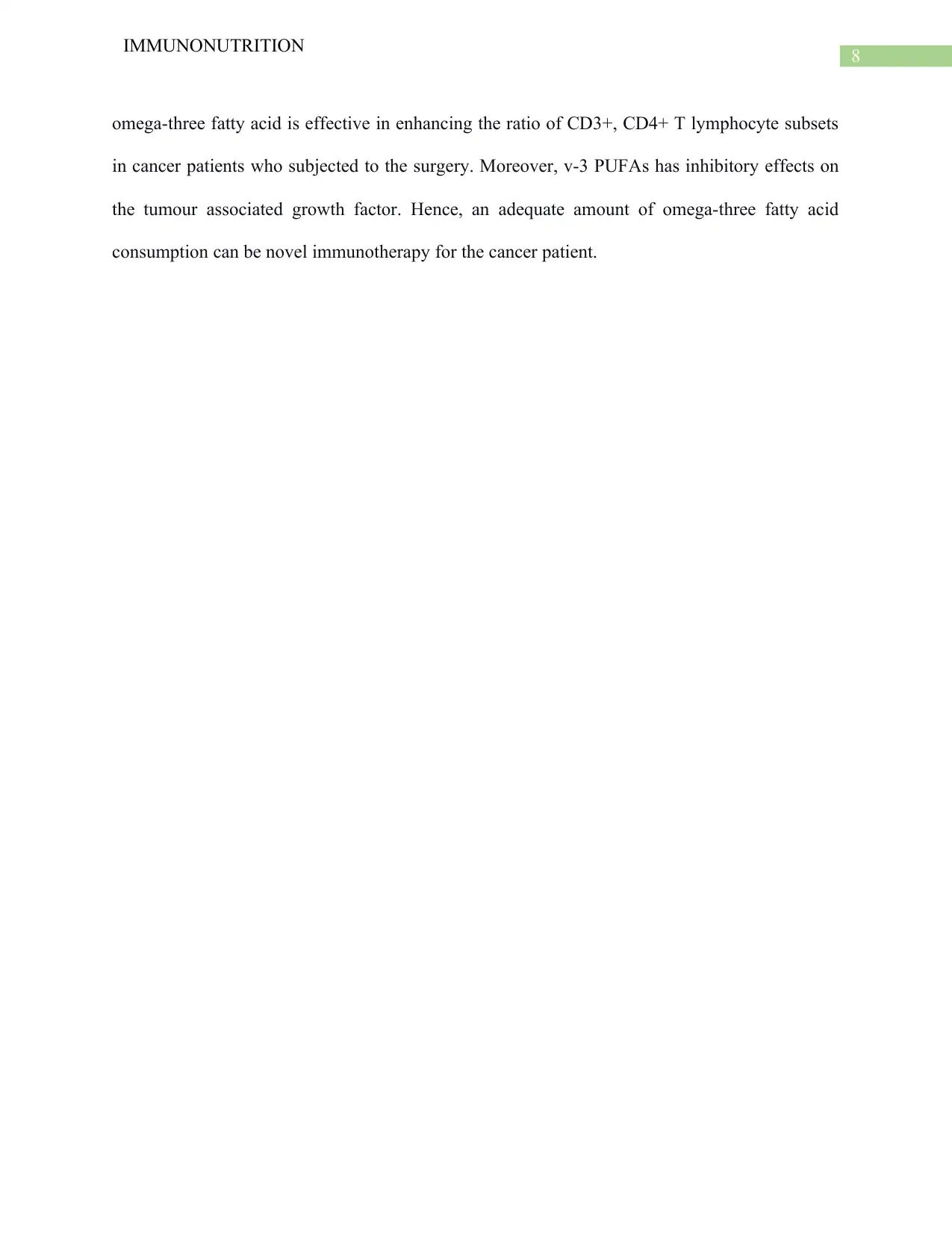
8
IMMUNONUTRITION
omega-three fatty acid is effective in enhancing the ratio of CD3+, CD4+ T lymphocyte subsets
in cancer patients who subjected to the surgery. Moreover, v-3 PUFAs has inhibitory effects on
the tumour associated growth factor. Hence, an adequate amount of omega-three fatty acid
consumption can be novel immunotherapy for the cancer patient.
IMMUNONUTRITION
omega-three fatty acid is effective in enhancing the ratio of CD3+, CD4+ T lymphocyte subsets
in cancer patients who subjected to the surgery. Moreover, v-3 PUFAs has inhibitory effects on
the tumour associated growth factor. Hence, an adequate amount of omega-three fatty acid
consumption can be novel immunotherapy for the cancer patient.
⊘ This is a preview!⊘
Do you want full access?
Subscribe today to unlock all pages.

Trusted by 1+ million students worldwide
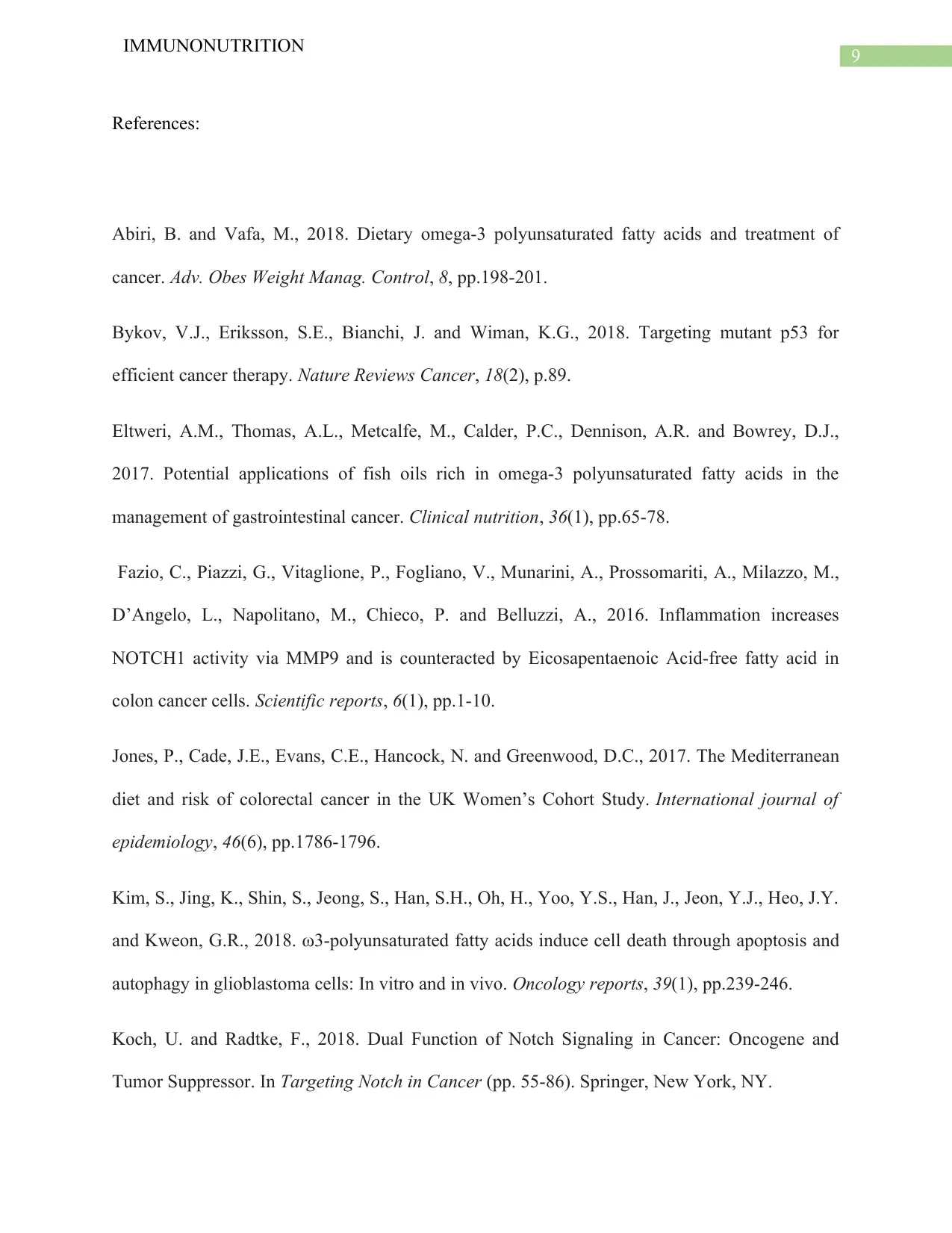
9
IMMUNONUTRITION
References:
Abiri, B. and Vafa, M., 2018. Dietary omega-3 polyunsaturated fatty acids and treatment of
cancer. Adv. Obes Weight Manag. Control, 8, pp.198-201.
Bykov, V.J., Eriksson, S.E., Bianchi, J. and Wiman, K.G., 2018. Targeting mutant p53 for
efficient cancer therapy. Nature Reviews Cancer, 18(2), p.89.
Eltweri, A.M., Thomas, A.L., Metcalfe, M., Calder, P.C., Dennison, A.R. and Bowrey, D.J.,
2017. Potential applications of fish oils rich in omega-3 polyunsaturated fatty acids in the
management of gastrointestinal cancer. Clinical nutrition, 36(1), pp.65-78.
Fazio, C., Piazzi, G., Vitaglione, P., Fogliano, V., Munarini, A., Prossomariti, A., Milazzo, M.,
D’Angelo, L., Napolitano, M., Chieco, P. and Belluzzi, A., 2016. Inflammation increases
NOTCH1 activity via MMP9 and is counteracted by Eicosapentaenoic Acid-free fatty acid in
colon cancer cells. Scientific reports, 6(1), pp.1-10.
Jones, P., Cade, J.E., Evans, C.E., Hancock, N. and Greenwood, D.C., 2017. The Mediterranean
diet and risk of colorectal cancer in the UK Women’s Cohort Study. International journal of
epidemiology, 46(6), pp.1786-1796.
Kim, S., Jing, K., Shin, S., Jeong, S., Han, S.H., Oh, H., Yoo, Y.S., Han, J., Jeon, Y.J., Heo, J.Y.
and Kweon, G.R., 2018. ω3-polyunsaturated fatty acids induce cell death through apoptosis and
autophagy in glioblastoma cells: In vitro and in vivo. Oncology reports, 39(1), pp.239-246.
Koch, U. and Radtke, F., 2018. Dual Function of Notch Signaling in Cancer: Oncogene and
Tumor Suppressor. In Targeting Notch in Cancer (pp. 55-86). Springer, New York, NY.
IMMUNONUTRITION
References:
Abiri, B. and Vafa, M., 2018. Dietary omega-3 polyunsaturated fatty acids and treatment of
cancer. Adv. Obes Weight Manag. Control, 8, pp.198-201.
Bykov, V.J., Eriksson, S.E., Bianchi, J. and Wiman, K.G., 2018. Targeting mutant p53 for
efficient cancer therapy. Nature Reviews Cancer, 18(2), p.89.
Eltweri, A.M., Thomas, A.L., Metcalfe, M., Calder, P.C., Dennison, A.R. and Bowrey, D.J.,
2017. Potential applications of fish oils rich in omega-3 polyunsaturated fatty acids in the
management of gastrointestinal cancer. Clinical nutrition, 36(1), pp.65-78.
Fazio, C., Piazzi, G., Vitaglione, P., Fogliano, V., Munarini, A., Prossomariti, A., Milazzo, M.,
D’Angelo, L., Napolitano, M., Chieco, P. and Belluzzi, A., 2016. Inflammation increases
NOTCH1 activity via MMP9 and is counteracted by Eicosapentaenoic Acid-free fatty acid in
colon cancer cells. Scientific reports, 6(1), pp.1-10.
Jones, P., Cade, J.E., Evans, C.E., Hancock, N. and Greenwood, D.C., 2017. The Mediterranean
diet and risk of colorectal cancer in the UK Women’s Cohort Study. International journal of
epidemiology, 46(6), pp.1786-1796.
Kim, S., Jing, K., Shin, S., Jeong, S., Han, S.H., Oh, H., Yoo, Y.S., Han, J., Jeon, Y.J., Heo, J.Y.
and Kweon, G.R., 2018. ω3-polyunsaturated fatty acids induce cell death through apoptosis and
autophagy in glioblastoma cells: In vitro and in vivo. Oncology reports, 39(1), pp.239-246.
Koch, U. and Radtke, F., 2018. Dual Function of Notch Signaling in Cancer: Oncogene and
Tumor Suppressor. In Targeting Notch in Cancer (pp. 55-86). Springer, New York, NY.
Paraphrase This Document
Need a fresh take? Get an instant paraphrase of this document with our AI Paraphraser
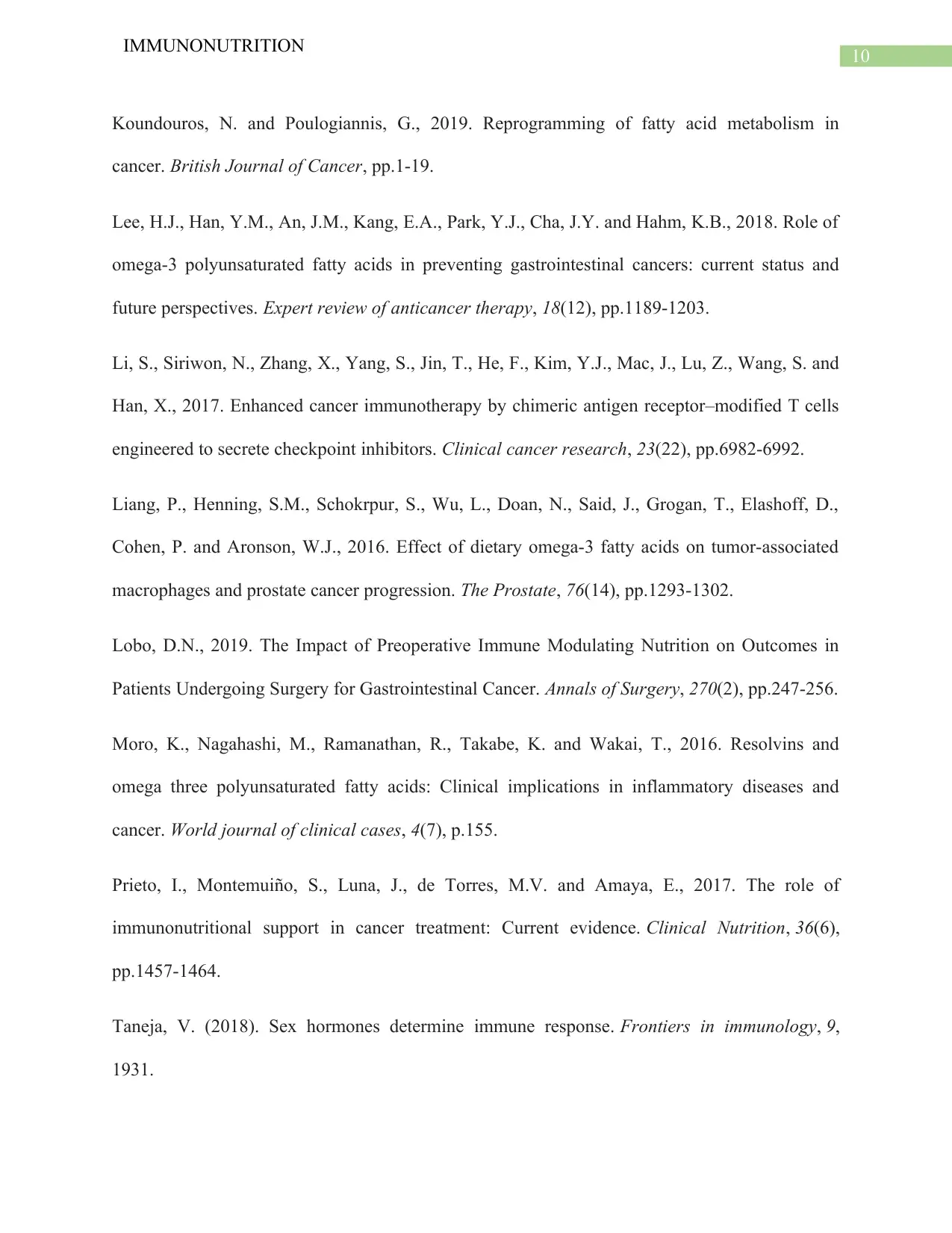
10
IMMUNONUTRITION
Koundouros, N. and Poulogiannis, G., 2019. Reprogramming of fatty acid metabolism in
cancer. British Journal of Cancer, pp.1-19.
Lee, H.J., Han, Y.M., An, J.M., Kang, E.A., Park, Y.J., Cha, J.Y. and Hahm, K.B., 2018. Role of
omega-3 polyunsaturated fatty acids in preventing gastrointestinal cancers: current status and
future perspectives. Expert review of anticancer therapy, 18(12), pp.1189-1203.
Li, S., Siriwon, N., Zhang, X., Yang, S., Jin, T., He, F., Kim, Y.J., Mac, J., Lu, Z., Wang, S. and
Han, X., 2017. Enhanced cancer immunotherapy by chimeric antigen receptor–modified T cells
engineered to secrete checkpoint inhibitors. Clinical cancer research, 23(22), pp.6982-6992.
Liang, P., Henning, S.M., Schokrpur, S., Wu, L., Doan, N., Said, J., Grogan, T., Elashoff, D.,
Cohen, P. and Aronson, W.J., 2016. Effect of dietary omega‐3 fatty acids on tumor‐associated
macrophages and prostate cancer progression. The Prostate, 76(14), pp.1293-1302.
Lobo, D.N., 2019. The Impact of Preoperative Immune Modulating Nutrition on Outcomes in
Patients Undergoing Surgery for Gastrointestinal Cancer. Annals of Surgery, 270(2), pp.247-256.
Moro, K., Nagahashi, M., Ramanathan, R., Takabe, K. and Wakai, T., 2016. Resolvins and
omega three polyunsaturated fatty acids: Clinical implications in inflammatory diseases and
cancer. World journal of clinical cases, 4(7), p.155.
Prieto, I., Montemuiño, S., Luna, J., de Torres, M.V. and Amaya, E., 2017. The role of
immunonutritional support in cancer treatment: Current evidence. Clinical Nutrition, 36(6),
pp.1457-1464.
Taneja, V. (2018). Sex hormones determine immune response. Frontiers in immunology, 9,
1931.
IMMUNONUTRITION
Koundouros, N. and Poulogiannis, G., 2019. Reprogramming of fatty acid metabolism in
cancer. British Journal of Cancer, pp.1-19.
Lee, H.J., Han, Y.M., An, J.M., Kang, E.A., Park, Y.J., Cha, J.Y. and Hahm, K.B., 2018. Role of
omega-3 polyunsaturated fatty acids in preventing gastrointestinal cancers: current status and
future perspectives. Expert review of anticancer therapy, 18(12), pp.1189-1203.
Li, S., Siriwon, N., Zhang, X., Yang, S., Jin, T., He, F., Kim, Y.J., Mac, J., Lu, Z., Wang, S. and
Han, X., 2017. Enhanced cancer immunotherapy by chimeric antigen receptor–modified T cells
engineered to secrete checkpoint inhibitors. Clinical cancer research, 23(22), pp.6982-6992.
Liang, P., Henning, S.M., Schokrpur, S., Wu, L., Doan, N., Said, J., Grogan, T., Elashoff, D.,
Cohen, P. and Aronson, W.J., 2016. Effect of dietary omega‐3 fatty acids on tumor‐associated
macrophages and prostate cancer progression. The Prostate, 76(14), pp.1293-1302.
Lobo, D.N., 2019. The Impact of Preoperative Immune Modulating Nutrition on Outcomes in
Patients Undergoing Surgery for Gastrointestinal Cancer. Annals of Surgery, 270(2), pp.247-256.
Moro, K., Nagahashi, M., Ramanathan, R., Takabe, K. and Wakai, T., 2016. Resolvins and
omega three polyunsaturated fatty acids: Clinical implications in inflammatory diseases and
cancer. World journal of clinical cases, 4(7), p.155.
Prieto, I., Montemuiño, S., Luna, J., de Torres, M.V. and Amaya, E., 2017. The role of
immunonutritional support in cancer treatment: Current evidence. Clinical Nutrition, 36(6),
pp.1457-1464.
Taneja, V. (2018). Sex hormones determine immune response. Frontiers in immunology, 9,
1931.
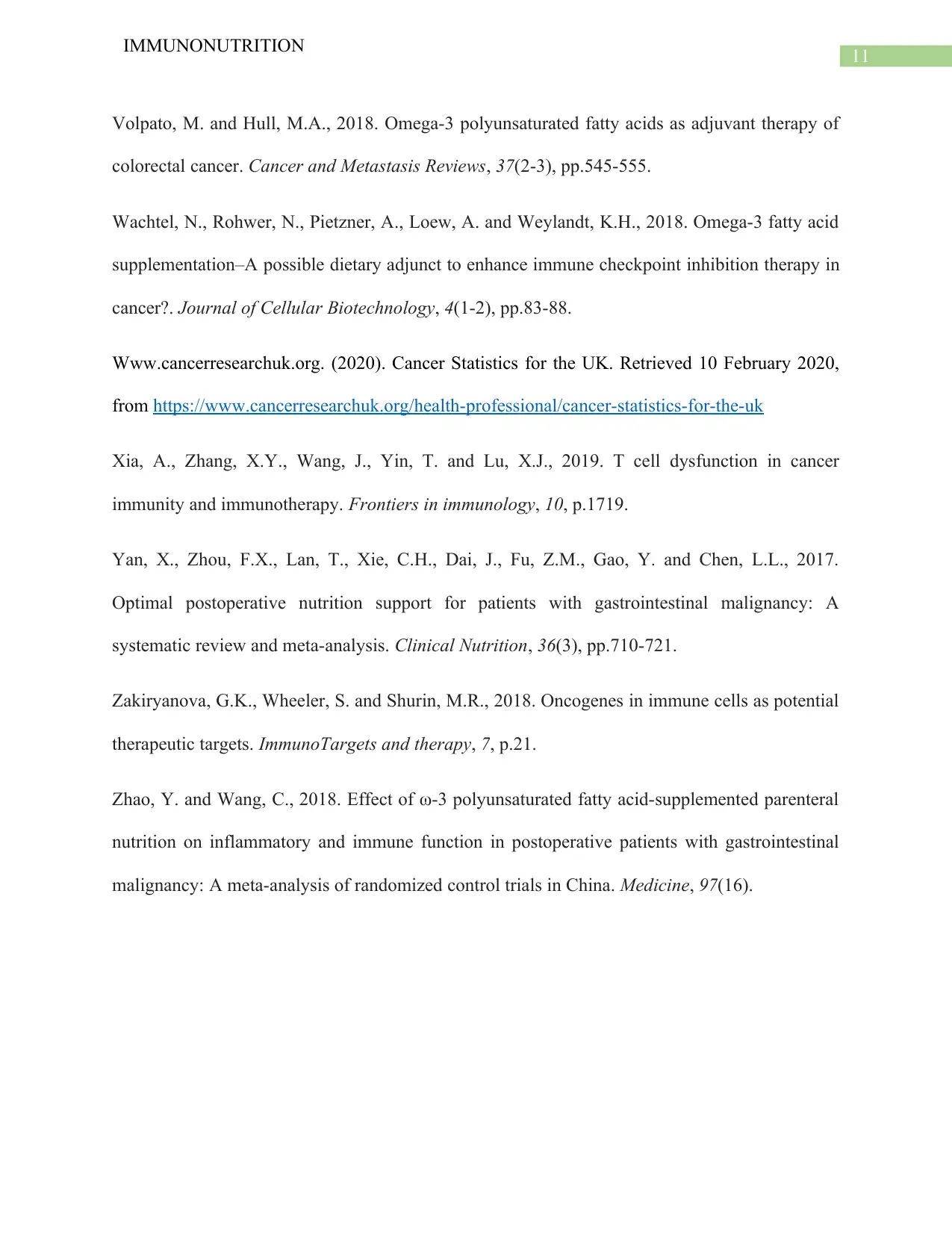
11
IMMUNONUTRITION
Volpato, M. and Hull, M.A., 2018. Omega-3 polyunsaturated fatty acids as adjuvant therapy of
colorectal cancer. Cancer and Metastasis Reviews, 37(2-3), pp.545-555.
Wachtel, N., Rohwer, N., Pietzner, A., Loew, A. and Weylandt, K.H., 2018. Omega-3 fatty acid
supplementation–A possible dietary adjunct to enhance immune checkpoint inhibition therapy in
cancer?. Journal of Cellular Biotechnology, 4(1-2), pp.83-88.
Www.cancerresearchuk.org. (2020). Cancer Statistics for the UK. Retrieved 10 February 2020,
from https://www.cancerresearchuk.org/health-professional/cancer-statistics-for-the-uk
Xia, A., Zhang, X.Y., Wang, J., Yin, T. and Lu, X.J., 2019. T cell dysfunction in cancer
immunity and immunotherapy. Frontiers in immunology, 10, p.1719.
Yan, X., Zhou, F.X., Lan, T., Xie, C.H., Dai, J., Fu, Z.M., Gao, Y. and Chen, L.L., 2017.
Optimal postoperative nutrition support for patients with gastrointestinal malignancy: A
systematic review and meta-analysis. Clinical Nutrition, 36(3), pp.710-721.
Zakiryanova, G.K., Wheeler, S. and Shurin, M.R., 2018. Oncogenes in immune cells as potential
therapeutic targets. ImmunoTargets and therapy, 7, p.21.
Zhao, Y. and Wang, C., 2018. Effect of ω-3 polyunsaturated fatty acid-supplemented parenteral
nutrition on inflammatory and immune function in postoperative patients with gastrointestinal
malignancy: A meta-analysis of randomized control trials in China. Medicine, 97(16).
IMMUNONUTRITION
Volpato, M. and Hull, M.A., 2018. Omega-3 polyunsaturated fatty acids as adjuvant therapy of
colorectal cancer. Cancer and Metastasis Reviews, 37(2-3), pp.545-555.
Wachtel, N., Rohwer, N., Pietzner, A., Loew, A. and Weylandt, K.H., 2018. Omega-3 fatty acid
supplementation–A possible dietary adjunct to enhance immune checkpoint inhibition therapy in
cancer?. Journal of Cellular Biotechnology, 4(1-2), pp.83-88.
Www.cancerresearchuk.org. (2020). Cancer Statistics for the UK. Retrieved 10 February 2020,
from https://www.cancerresearchuk.org/health-professional/cancer-statistics-for-the-uk
Xia, A., Zhang, X.Y., Wang, J., Yin, T. and Lu, X.J., 2019. T cell dysfunction in cancer
immunity and immunotherapy. Frontiers in immunology, 10, p.1719.
Yan, X., Zhou, F.X., Lan, T., Xie, C.H., Dai, J., Fu, Z.M., Gao, Y. and Chen, L.L., 2017.
Optimal postoperative nutrition support for patients with gastrointestinal malignancy: A
systematic review and meta-analysis. Clinical Nutrition, 36(3), pp.710-721.
Zakiryanova, G.K., Wheeler, S. and Shurin, M.R., 2018. Oncogenes in immune cells as potential
therapeutic targets. ImmunoTargets and therapy, 7, p.21.
Zhao, Y. and Wang, C., 2018. Effect of ω-3 polyunsaturated fatty acid-supplemented parenteral
nutrition on inflammatory and immune function in postoperative patients with gastrointestinal
malignancy: A meta-analysis of randomized control trials in China. Medicine, 97(16).
⊘ This is a preview!⊘
Do you want full access?
Subscribe today to unlock all pages.

Trusted by 1+ million students worldwide
1 out of 12
Your All-in-One AI-Powered Toolkit for Academic Success.
+13062052269
info@desklib.com
Available 24*7 on WhatsApp / Email
![[object Object]](/_next/static/media/star-bottom.7253800d.svg)
Unlock your academic potential
Copyright © 2020–2026 A2Z Services. All Rights Reserved. Developed and managed by ZUCOL.